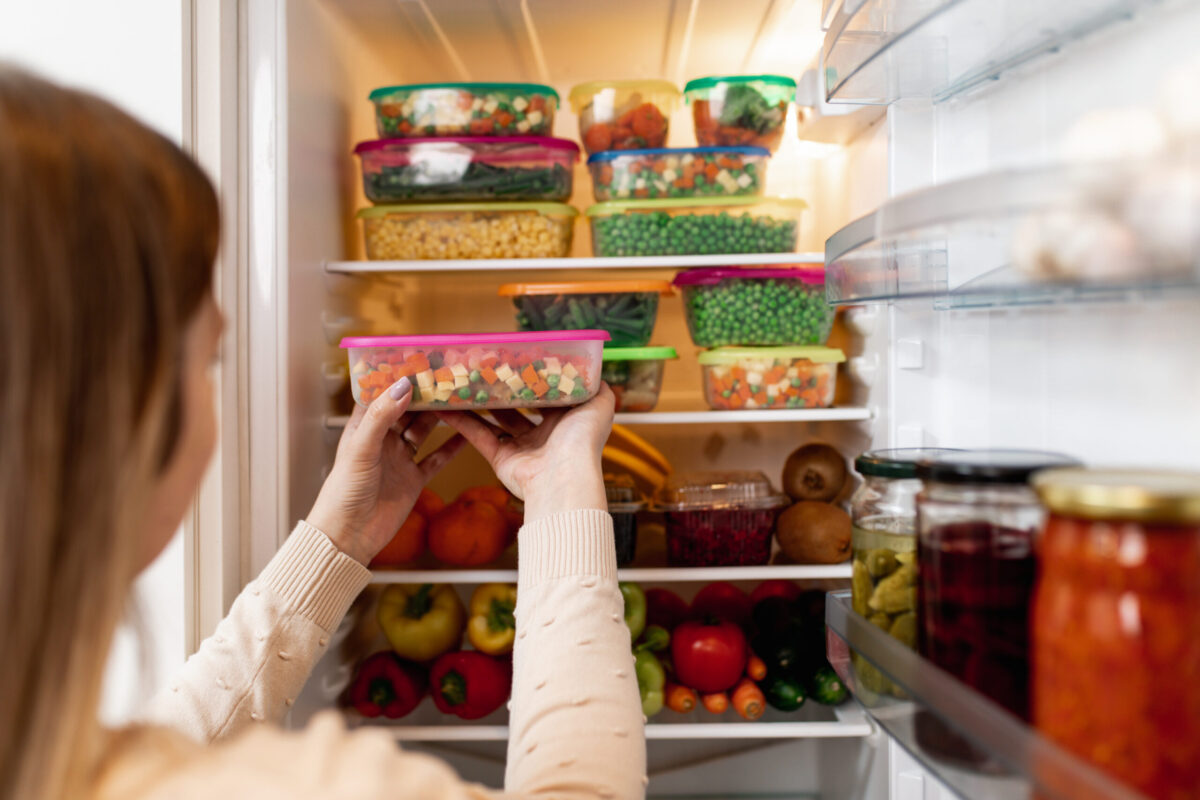According to dietitians, eating seasonally and cooking at home are key steps toward building nutritious eating habits. But that can mean a lot of trips to the grocery store — if you’re not shopping smartly.
To learn a few tricks of the food-storage trade, WellTuned spoke with Melissa Perry and Sarah Provence, two registered dietitian-nutritionists for BlueCross BlueShield of Tennessee.
11 tips for better food storage
1. Store tender herbs in water
Provence: Tender herbs include basil, chives, cilantro, dill, mint, parsley and tarragon. These herbs stay fresh longer in water. Clip the stems, remove dead leaves and put them in a tall container (such as a glass jar) with an inch of water, just like you would flowers. Change the water every few days.
2. Wrap berries in paper towels
Provence: Berries go bad quickly. Wrap them in a paper towel to extend their shelf-life. And don’t wash them before you put them in the fridge. Added moisture makes them spoil quicker.
3. Keep frozen produce on hand
Perry: Fresh produce can get expensive, especially if it goes uneaten. Frozen fruits and vegetables are flash-frozen at their peak ripeness, so you get all of the vitamins and minerals without worrying about spoilage. It also saves you time slicing and dicing! Frozen fruits, in particular, are great for smoothies, and they thaw quickly to use as a yogurt topping. They’re also refreshing as a snack in the warmer summer months.
4. Store onions and potatoes separately
Provence: Onions and potatoes both release moisture, which can cause each to spoil faster. Store them separately in cool, dry places.
Allium 101: A guide to onions, garlic, leeks, chives & more
5. Look out for sneaky sodium
Perry: Canned vegetables have a long shelf-life, but they may contain a lot of salt. Look for low-sodium options or rinse vegetables to remove some of the sodium before using them.
Provence: In general, packaged foods have more sodium. A good rule of thumb is that if an item has more than 140 mg of sodium per serving, look for a lower sodium option.
6. Expand your idea of freezer foods
Provence: There are some things people don’t think of as ‘freezer food’’ that actually freezes quite well:
- Eggs: Crack, whisk and freeze these in freezer-safe plastic containers with the number of eggs written on the outside.
- Deli meat: Meats like ham and turkey have a short shelf life, especially if you get it sliced at the butcher, but they freeze well.
- Bread: Bread likes cool, dark and dry places. If you know you won’t eat a whole loaf before it spoils, slice it and freeze it. Then thaw out slices as you need them.
7. Bag your sides
Perry: Microwaveable, steam-in-bag veggies are quick and easy dinner sides. Frozen mirepoix (chopped onions, bell pepper, celery and carrots) are also a great thing to have on hand to add to omelets, soups or a stir fry to boost nutrients.
15 quick tricks to add extra fruits & vegetables to your diet [link when live]
8. Keep dairy off the door
Provence: Milk needs to be kept in a colder part of the fridge to prevent contamination and maximize its shelf-life. The door is always the warmest place.
9. Line up your shopping and clean-out days
Provence: Keeping your fridge clean is important to your health, but it’s easy to forget to do it regularly. Here’s how I do it:
- Label everything so I have a visual cue of when it needs to be eaten. You can use the date you cooked it or the date it needs to be used by — just stick with whichever you pick. I also live by the first in, first out method (FIFO).
- Once a week, I clean out my fridge so it doesn’t ever get to be a huge task. The day before trash day, I move everything that needs to be used ASAP to the top shelf, and I toss anything that’s expired. While I do that, I make my grocery list for the week so I never run out of anything I need.
- Once a month, while I do my weekly clean out, I also take everything out of the fridge and wipe it down. Since I toss expired items out once a week, it’s a lot less daunting to clean my whole fridge.
10. Keep a fridge-and-freezer list
Provence: I keep a running list in the notes section on my phone of what’s in my fridge and freezer. With the fridge, I can remind myself of which meals I have ready to eat, even when I’m not at home. With the freezer, I know what ingredients I have on hand, and when I need to use them, without having to dig through everything. It also makes me more likely to use things before they get freezer-burned.
11. Remember: there’s an app for that
Provence: If you’re ever wondering how long a certain food will stay good, try the USDA’s Foodkeeper app. It teaches you how to store foods and beverages, and how to keep items fresher longer.
8 more tips to organize your fridge and keep food safe
Get more information about specific health terms, topics and conditions to better manage your health on bcbst.com. BlueCross BlueShield of Tennessee members can access wellness-related discounts on fitness products, gym memberships, healthy eating and more through Blue365®. BCBST members can also find tools and resources to help improve health and well-being by logging into BlueAccess and going to the Managing Your Health tab.


